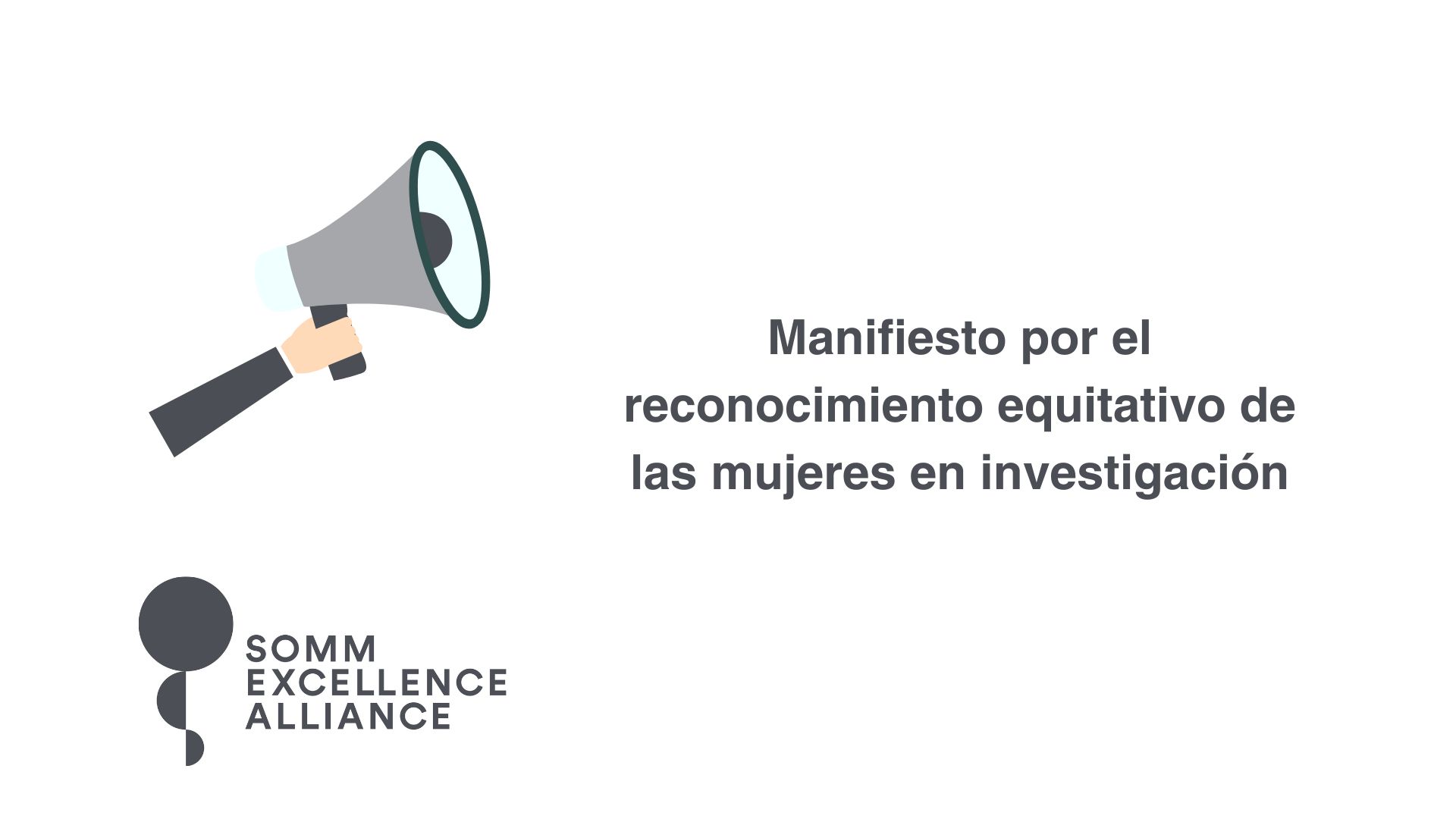Adherence to the SOMMa manifesto for the Equitable Recognition of Women in Research
Research awards play a vital role in showcasing to society the significant scientific contributions that drive the advancement of knowledge—the foundation of technological, social, and economic development. These awards also highlight the quality and importance of science, while strengthening the reputation of the awarded researchers.

We, the entities and individuals endorsing this manifesto, supported by the Alliance of Severo Ochoa Centers of Excellence and María de Maeztu Units of Excellence (SOMMa), address the academic and scientific community to advocate for increasing the number of female nominees in various research award calls in our country.
To illustrate, we highlight the situation regarding the National Research Awards, which is comparable to other prestigious national and international award schemes across different research fields. We reference the historical data on the National Research Awards (up to 2023) available on the Ministry of Science, Innovation, and Universities website, as well as newly published information about the awards granted in the 2024 call.
In 2023, no National Research Award was granted to a woman. In the 2024 edition, 12 out of 20 awards were given to women (5 in the senior category and 7 in the junior category). While the 2024 outcome may appear promising, the historical track record of awards is concerning in terms of gender representation.
No woman has yet been awarded the:
- "Enrique Moles" National Research Award in the area of Chemical Science and Technology (out of 12 awards since 2001).
This situation does not reflect the participation and scientific contributions of female researchers in this field and demonstrates a significant gender gap that urgently needs to be addressed. Furthermore, in other disciplines covered by the National Research Awards, the presence of female awardees remains similarly low:
- "Blas Cabrera" National Research Award in the area of Physical, Material, and Earth Sciences (since 2001): 1 female awardee, in 2024 (out of 12 awards).
- "Pascual Madoz" National Research Award in the area of Law, Economics, and Social Sciences (since 2002): 2 female awardees (out of 12 awards).
- "Gregorio Marañón" National Research Award in Medicine and Health Sciences (since 1997): 2 female awardees (out of 14 awards).
- "Alejandro Malaspina" National Research Award in Natural Resource Science and Technology (since 2001): 1 female awardee (out of 12 awards).
- "Julio Rey Pastor" National Research Award in Mathematics and Information and Communication Technologies (since 2001): 1 female awardee (out of 12 awards).
- "Leonardo Torres Quevedo" National Research Award in Engineering (since 1983): 2 female awardees (out of 19 awards, one double).
- "Juan de la Cierva" National Research Award in Technology Transfer (since 2001): 3 female awardees (out of 12 awards).
- "Santiago Ramón y Cajal" National Research Award in Biology (since 1982): 5 female awardees (out of 20 awards, 3 double).
- "Ramón Menéndez Pidal" National Research Award in Humanities (since 1983): 6 female awardees (out of 19 awards, 2 double).
The National Research Awards, like most prestigious national and international awards, follow an external nomination process by recognized members of the scientific community (research centers, universities, professional associations, or groups of renowned researchers).
The number of nominations for female researchers in the National Research Awards has historically been low, reflecting this inequality. For example, in the 2023 National Research Awards call, only 24 out of 114 total nominations were for women—a minority in all fields—which does not correspond to the presence (number and percentage) of female researchers in those scientific disciplines.
However, the 2024 National Research Awards saw significant changes in the call, including measures to encourage nominations of female researchers, which likely contributed to the notable increase in awarded women researchers.
It is evident that there is a systemic issue limiting the participation and recognition of female researchers' scientific contributions. This issue extends beyond the National Research Awards to other prestigious awards highlighting distinguished research careers.
It is crucial for all processes linked to research awards to truly incorporate diversity. This not only acknowledges individual excellence but also promotes a more equitable and enriching environment for scientific research while inspiring younger generations—especially women.
We need all stakeholders to commit to gender equity in science and research. A collective effort by the academic and scientific community is essential to overcome barriers that limit women's potential in science and to build a more inclusive and equitable future where everyone has equal opportunities to contribute to the advancement of knowledge and to be recognized for their contributions.
Therefore, we, the undersigned entities and individuals, urge organizations granting prestigious R&D&I awards in Spain and those responsible for the selection and nomination processes to continue discussing, promoting, and implementing measures to ensure gender equity in research award nomination and evaluation processes.
Signatory Entities of the “Manifesto for the Equitable Recognition of Women in Research”
- Alianza de Centros de Excelencia Severo Ochoa y Unidades de Excelencia María de Maeztu (SOMMa)
- Asociación de Mujeres Investigadoras y Tecnólogas
- Confederación de Sociedades Científicas de España
- Federación de Asociaciones Científico Médicas